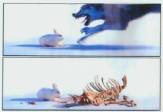
|

|

|
 |
 |
 |
If you're here, there's a presumption that you've previously run into the concept of "Hike your own hike (HYOH)." The problem with HYOH is that most people think it's a great idea so they give it lip service, but then fail to develop any real understanding of what it is and how to apply it. The Thruhiking Papers cover the basics of the HYOH concept, and then we took another swing at it specifically with regard to the CDT. So it's time to trot it out again and see who gets irritated with this particular incarnation.
Let's start with what I call the "Male Macho Mileage Syndrome" or M³S. I've gotten objections to my use of the term M³S, but I didn't invent the concept. It came from Maine Rose of AT fame. And she defined it as a testosterone-driven high-mileage malady that mainly affects the male of the species.
M³S becomes evident when someone goes out to do a 6 month hike and then proceeds to build up their daily mileage so they finish a month or two (or more) early. And then they complain that they finished too early - as if it were someone else's fault.
That's assuming they finish at all. What I've seen is that a lot of those who get into this mode don't finish - many of them get stress fractures, tendonitis, mental/emotional burnout, etc. and end up going home. And I've seen it happen year after year - on all the long trails. Just for clarification - it's a 99% male problem. Very few females seem to have it, although a few are unfortunate enough to be dragged along by their partner/boyfriend/husband. Most (but not quite all) females seem to be smarter than their male counterparts.
M³S is not specifically defined by speed, or even by long hiking hours - it IS specifically defined by the thoughtlessness of those long miles. And just for clarification - it's not entirely confined to the "young and foolish". There are some "old fools" out there, too.
The younger hikers tend to get caught up in the joy of testing their limits - the older ones tend to get caught up in their need to prove that they've still "got it" - that they're not "over-the-hill" - that they can still compete. That's what's called a "mid-life crisis."
One of the complaints I've heard about the AT and PCT has to do with "competitiveness" - the "I did 20 (or 30 - or 40) miles today - why didn't you?" type attitude that some thruhikers seem to acquire. And sometimes the sap rises, the testosterone flows - and other hikers get caught up in their enthusiasm (arrogance? ) - whatever. Sometimes the result is fun and sometimes it's funny, but mostly it more closely resembles tragedy.
The "funny" part goes something like this -- someone tells me they started the AT on April 1st and they're gonna get to Katahdin in October - that they want to see the leaves change in Maine. And then they tell me they're averaging 20 mile days. At which point, I've been known to laugh at them - long, loudly and openly - because they're not fooling me - just themselves.
It doesn't take a rocket scientist to figure this one out. The AT is getting close to 2200 miles long - so if they're averaging 20 mile days, it'll take them 109 days (plus the time they spend in town) to finish the trail. Assuming 20 days in town (which isn't at all unusual) that means they'll be headed home in early August. And they won't get to see the leaves change in Maine.
Translating that to the CDT - if your CDT route is 2600 miles long and you average 20 miles per day and take 20 town days, then walking the trail will take 150 days. If you're out there for 6 months, that means you'll finish a month early.
So - the question becomes - Did you go out there for 6 months? Or was your goal to finish as fast as possible? Those two goals are NOT compatible. And those who claim both really don't understand what they're saying.
Part of the problem is that after a couple months on the trail, 20 - 25 mile days aren't that big a deal for most hikers.
On the PCT, we deliberately and with malice aforethought slowed down to 23 mpd through Oregon and Washington in order to NOT finish too early. We started late every morning, stopped early every afternoon - and took 2 hour lunch breaks. And we still finished the PCT 3 days earlier than we wanted to. It's not always easy to "hike your own hike."
The reason we worked so hard to go slower is that we were out there to maximize our "time-on-trail" - in the case of the PCT, to spend 5 months in the mountains. If you're out there just to "do" the trail, then go for the 25 - 30 mile days and get it over with, so you can go home to the rat race. But if you're out there to enjoy spending 5 or 6 months (or more) in the mountains, then you're screwing up by the numbers if you're doing 25 mile days.
For us, it's a choice - Do we want to spend as much time as possible on the trail? Or do we want to get back to the job and the bills and the boss and the rat race a month or two early? Is that what you want?
For some people - it is. They'd rather be Speedy Gonzales. Or, in some cases, they have good reason to be so - like having a deadline to finish so they can go back to school.
Others of us would rather be the tortoise.
Now - I don't frankly care what anybody else's mileage is or how soon they finish. I have no problem with those who hike fast - or run - or crawl. Your speed is yours and you're the one who has to live with the results - one way or the other. I have no problem with those who hike 10 or 12 - or 20 - hours each day. That's your choice, not mine. I have, in fact, supported and defended those who "run" the trails - the speed hikers. They're doing what they went out there to do - and many of those who bitch about them fail to do what "THEY" went out there to do because they either don't know why they're out there - or they conveniently "forget" their original purpose and get caught up in the mindless quest for miles.
And it's that thoughtlessness and, by extension, ignorance of possible consequences, that I find to be hilarious - and sometimes annoying. I could easily live without having to listen to the kind of self-justification some people use to explain it to themselves and others while they're on the trail. And the after-the-trail complaints that they finished too early - as if it were someone else's fault.
Decide what you want out of the hike - and then figure out what you have to do to get it. HYOH only works if you KNOW what "your hike" is to start with. If you don't know what "your hike" is - then you're just "playing it by ear."